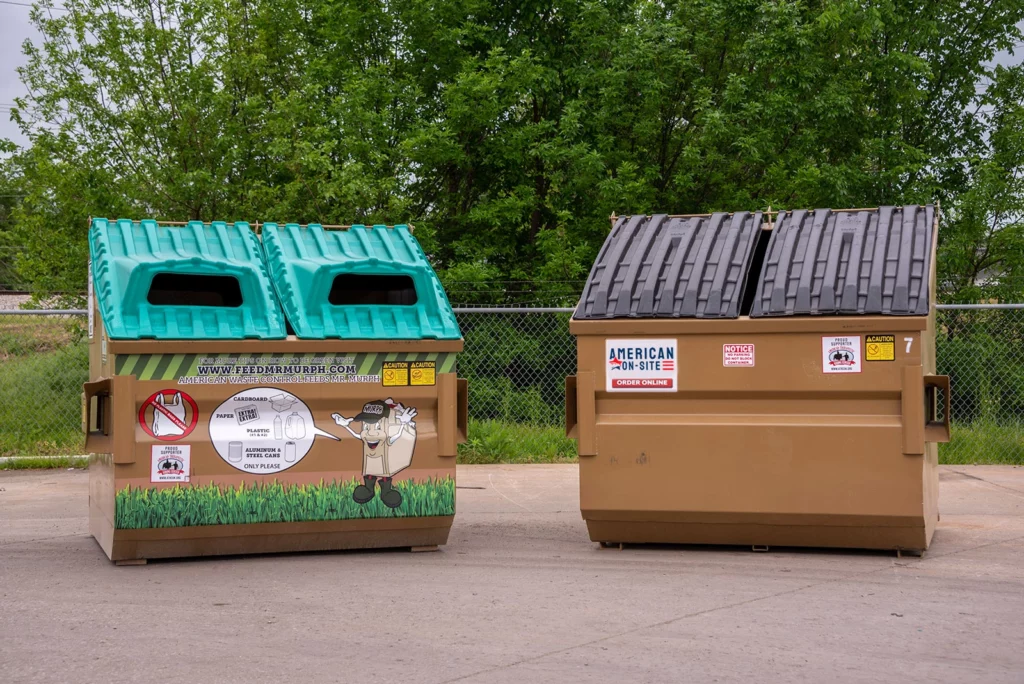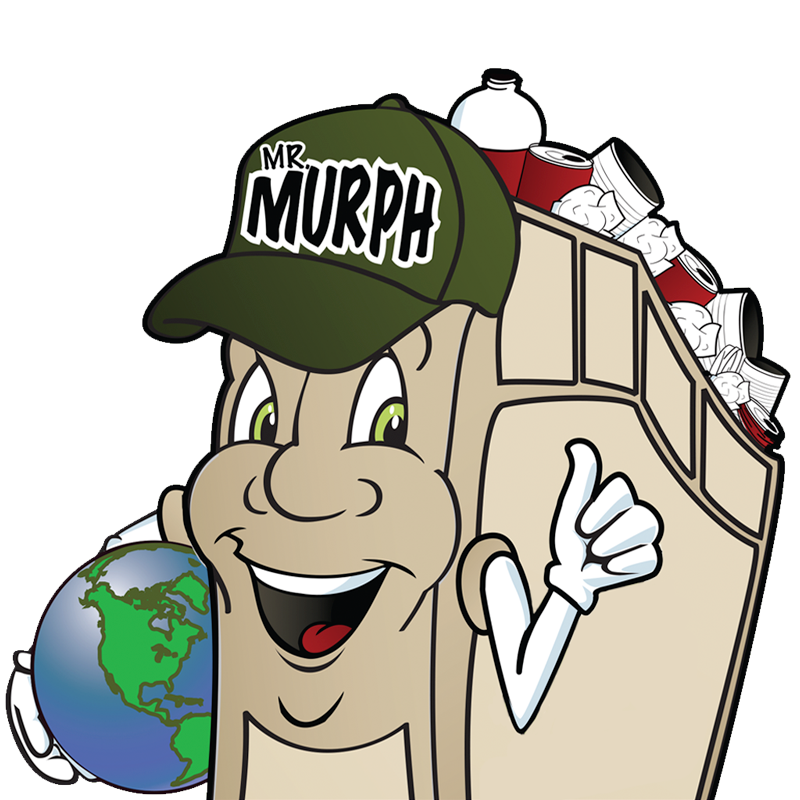Start recycling at your business, facility, and events with the Feed Mr. Murph program.

Meet Mr. Murph, our recycling mascot, a testament to American On-Site’s commitment to advanced recycling technology and education. Originating from our state-of-the-art Material Recovery Facility (MRF) in Oklahoma, Mr. Murph stands as a beacon of recycling excellence.
Our ‘Feed Mr. Murph’ program is dedicated to educating households, schools, and especially the younger generation on the nuances of proper recycling, amplifying our efforts at the MRF to divert even more waste from landfills.
Having witnessed the transformative impact of the ‘Feed Mr. Murph’ program locally, we’re now on a mission to expand this educational initiative across the nation.
Talk to us about championing sustainability by integrating ‘Feed Mr. Murph’ into your office practices and upcoming events.


Elevate your company's sustainability efforts with our proven recycling program.
Boost employee engagement and morale by championing a greener workplace.
Differentiate your brand in the market by aligning with a trusted and innovative recycling initiative.
Reduce operational waste costs and enhance efficiency through expert guidance.
Showcase your commitment to the environment and community with a comprehensive recycling approach.
Partner with Feed Mr. Murph to ensure a seamless, effective, and impactful recycling journey for your business.
Embarking on a recycling journey or looking to enhance your current practices? Dive into our comprehensive Q&A section to gain insights, dispel myths, and empower your business with knowledge. Let’s make sustainability simple and impactful together.
To initiate a recycling program at your business, reach out to American On-Site. Our recycling consultants will assist in crafting a sustainability plan tailored for your workplace. We'll set up appropriate recycling bins throughout your office and a dedicated recycling container adjacent to your existing dumpster. To foster a recycling culture, we provide Feed Mr. Murph recycling education materials, including posters, flyers, guides, and stickers. The best part? Even if you're contracted with another waste collection service, you can still utilize our recycling services. Contact our customer service team to discover the simplicity of integrating a recycling container into your business operations. By segregating recyclables from your waste, you not only champion environmental causes but potentially reduce overall disposal costs.
Recycling in the office reduces raw material costs, boosts profitability, and lessens the company's environmental footprint. Furthermore, an eco-friendly approach promotes a positive workplace culture, attracting and retaining elite talent. With American On-Site, businesses can effortlessly meet their sustainability goals.
For events, American On-Site supplies robust, recyclable cardboard bins, accompanied by clear recycling guidelines. Educating staff and attendees about proper recycling practices minimizes contamination and obviates the need for subsequent sorting. Our comprehensive event recycling guide encompasses aspects like management commitment, reuse strategies, waste-free event promotion, green team roles, vendor agreements, collection services, signage, equipment, and more, ensuring a holistic approach to event recycling.
To implement a successful recycling strategy, facilities should first appoint a recycling coordinator. American On-Site can then assist in assessing the facility's 'waste stream' and provide essential educational resources. We also offer a dedicated recycling hauling solution. Key recyclable materials to consider include aluminum, plastics, glass, corrugated cardboard, and various paper types.
The costs of establishing a recycling program can fluctuate based on factors like location, employee count, and foot traffic. However, American On-Site offsets these costs by offering value-added services like consultancy and educational resources, aiding businesses in realizing their sustainability aspirations.
Promoting recycling awareness is crucial for the success of any recycling program. With American On-Site, this becomes an engaging endeavor. Our Feed Mr. Murph program infuses fun into the learning process, ensuring that employees are not only informed but also enthusiastic about recycling.
Measuring the success of your business recycling program involves a combination of quantitative assessments and qualitative observations. Here's how you can gauge its effectiveness:
Volume and Weight Metrics: Track the amount of recyclable materials collected over time. A consistent increase in the volume or weight of recyclables indicates growing participation and effectiveness.
Waste Audit: Conduct regular waste audits to determine the percentage of recyclable materials in your waste stream. A decrease in recyclables in the trash signifies improved recycling habits.
Cost Savings: Monitor any reductions in waste disposal costs. As more materials are diverted from the trash to recycling, you may notice a decrease in waste disposal fees.
Employee Engagement: Survey employees to gauge their awareness, participation, and feedback on the recycling program. High engagement levels often correlate with a successful program.
Environmental Impact: Calculate the environmental benefits using metrics like the reduction in carbon emissions, water saved, and trees preserved due to your recycling efforts.
Achievement of Set Goals: Compare your results with the sustainability goals or benchmarks you set at the beginning. Meeting or exceeding these goals is a clear indicator of success.
Feedback from Partners: Engage with your recycling service provider, like American On-Site, for feedback and data on contamination rates, collection frequency, and other insights that can help assess the program's success.
Remember, the key to a successful recycling program is continuous improvement. Regularly review and adjust your strategies based on the data and feedback you gather.
Service Areas
Texas
Dallas, TX
Fort Worth, TX
Austin, TX
San Antonio, TX
Corpus Christi, TX
Houston, TX
Beaumont, TX
El Paso, TX
Killeen, TX
Lubbock, TX
McAllen, TX
Waco, TX
Laredo, TX
Oklahoma & Arkansas
Tulsa, OK
Owasso, OK
Broken Arrow, OK
Oklahoma City, OK
Edmond, OK
Norman, OK
Bentonville, AR
Fayetteville, AR
Little Rock, AR
Rogers, AR
Louisiana & Mississippi
Baton Rouge, LA
New Orleans, LA
Hattiesburg, MS
Biloxi, MS
Jackson, MS
Meridian, MS
Lafayette, LA
Alabama
Mobile, AL
Huntsville, AL
Birmingham, AL
Montgomery, AL
Florida
Jacksonville, FL
Gainesville, FL
Orlando, FL
Tampa, FL
Fort Myers, FL
Miami, FL
Sarasota, FL
Pensacola, FL
Georgia & South Carolina
Savannah, GA
Atlanta, GA
Charleston, SC
Columbia, SC
Greenville, SC
Augusta, GA
Myrtle Beach, SC
North Carolina & Virginia
Charlotte, NC
Raleigh-Durham, NC
Fayetteville, NC
Norfolk, VA
Richmond, VA
Winston-Salem, NC
Virginia Beach, VA
Mid-Atlantic
Northeast
New York City, NY
Boston, MA
Buffalo, NY
Pittsburgh, PA
Bar Harbor, ME
Providence, RI
Midwest
Cleveland, OH
Columbus, OH
Detroit, MI
Chicago, IL
Indianapolis, IN
Milwaukee, WI
Louisville, KY
Madison, WI
Clarksville, TN
Grand Rapids, MI
Cincinnati, OH
St. Paul, MN
Minneapolis, MN
Fort Wayne, IN
Lexington, KY
Southeast & Tennessee
Plains & Rockies
Kansas City, MO
St. Louis, MO
Denver, CO
Omaha, NE
Des Moines, IA
Colorado Springs, CO
Rapid City, SD
Wichita, KS
Billings, MT
West & Pacific Coast
Phoenix, AZ
Tucson, AZ
Flagstaff, AZ
Las Vegas, NV
Reno, NV
Oceanside, CA
Los Angeles, CA
San Diego, CA
San Francisco, CA
Sacramento, CA
Portland, OR
Seattle, WA
Boise, ID
Salt Lake City, UT
Provo, UT
Moab, UT
Anchorage, AK
Honolulu, HI
Jackson, WY
Fresno, CA
Bakersfield, CA
San Jose, CA
Albuquerque, NM
Spokane, WA